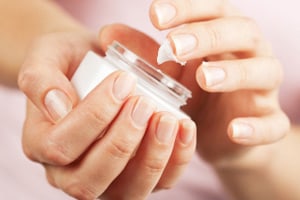
The Food and Drug Administration (FDA) is warning the beauty industry about some of the claims being made for some of its products. Five warnings letters have gone out to companies since November. The most recent warning letter went out to StriVectin, whose wrinkle creams are sold by a wide range retailers, including Costco and […]

FDA Warns Wrinkle Cream Maker About Claims
The Food and Drug Administration (FDA) is warning the beauty industry about some of the claims being made for some of its products. Five warnings letters have gone out to companies since November.
The most recent warning letter went out to StriVectin, whose wrinkle creams are sold by a wide range retailers, including Costco and Nordstrom, the Today show reports. The FDA objects to language in the ads that makes the products seem like drugs, not cosmetics. The language includes
According to the February 12 warning letter, “The claims on your website indicate that the products are intended to affect the structure or any function of the human body, rendering them drugs under the (Federal Food, Drug, and Cosmetic) Act.”
When StriVectin says its “Advanced Tightening Neck Cream,” can “restore the elastin fiber architecture, providing noticeable lift and improving resistance to gravity,” the company is actually claiming that product is a drug but it has not been through the FDA’s review process. “New drugs,” under section 505(a) of the Act , may not be legally marketed in the U.S. without prior approval from FDA in the form of an approved New Drug Application (NDA), the FDA explains in the letter. In response, StriVectin has changed the wording on its web site. “Over time, the visible effects of gravity appear reversed for even more refined and toned definition of the neck line, profile, and décolleté,” it now says. The mention of “restoring” elastin fiber has been removed. Emmy Brooks, vice president for beauty at StriVectin, said by email, “We stand by the efficacy of our products which is proven by scientific testing and clinical trials.” Brooks said the company is “doing everything in our power to ensure that our communication to the public complies with the Federal Food, Drug & Cosmetic Act.”
Products simply intended to make people more attractive are generally cosmetics, according to the FDA. Moisturizing, for example, is a cosmetic claim and a product intended to make lines and wrinkles less noticeable by moisturizing the skin is a cosmetic. Makeup products intended to make the signs of aging less noticeable by hiding them are also cosmetics. Cosmetics must be safe when used according to product labeling or in the way such products are customarily used. The law does not require cosmetics to be approved by the FDA before they go on the market.
Products intended to affect the “structure or function of the body,” however, must have FDA approval for both safety and effectiveness before they go on the market. A product intended to remove wrinkles, for example, not just disguise them, or a product that claims to increase the skin’s production of collagen, is a drug and must go through the clearance process.
Read more at: Over-The-Counter Creams And Gels Tied To Serious Injuries, Deaths


